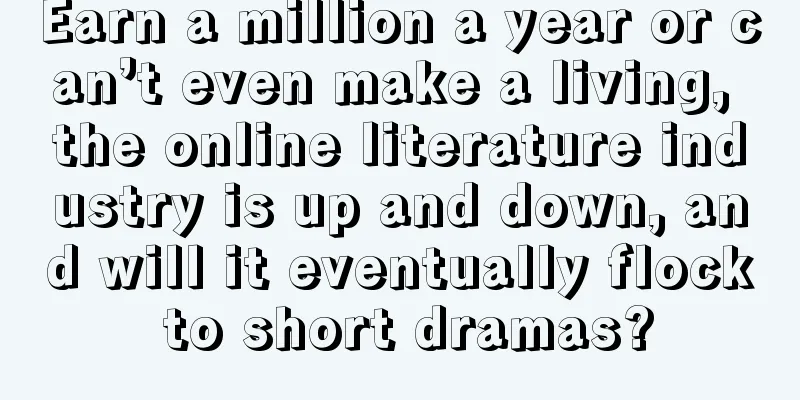Earn a million a year or can’t even make a living, the online literature industry is up and down, and will it eventually flock to short dramas?

On January 11, the topic #2000 online writer revealed to earn millions a year# became a hot search. It is said that this author was also selected as one of the "Twelve Heavenly Kings" of exemplary online literature writers in 2023. This author is currently a senior in college. Hot industries such as online literature, computers, and data processing continue to create "high-salary" myths. Especially in the online literature industry, from Tianxia Bachang and Dangnian Mingyue appearing on the list of rich writers a few years ago, Tang Jia San Shao earning 110 million, to today's post-00s authors earning millions a year... Online literature is now a popular sideline choice for many young people. The younger generation of authors means that the online literature industry is currently regaining vitality. From the income and flow of online writers, we seem to be able to get a glimpse of the subtle changes that are taking place in today's online reading industry. With the emergence of new phenomena such as online literature going overseas, paid short dramas with the same origin as online literature attracting money, and the rise of free novel platforms, the online literature industry seems to have ushered in a new bonus period. 1. Only a minority earn a million dollars a yearAccording to the Pareto principle, 20% of the people control 80% of the wealth. The core of this principle also applies to the online literature industry , that is, the number of top authors is small, and they receive a larger proportion of royalties and attention, while the "cake" that can be shared by authors in the middle or bottom is much smaller. It is reported that this post-00 author who "earns a million a year" uses the pen name Ji Yueren. He started serializing the fantasy novel "Xuanjian Xianzu" on Qidian Chinese website in 2022. He has currently serialized 2.018 million words and it has not been completed yet. Image source network The "Twelve Heavenly Kings", the online literature role model writers for which he was selected, was founded by China Literature Group, which aims to select a group of high-potential authors for recognition. Some industry insiders said that being selected as one of the "Twelve Heavenly Kings" means that these twelve online writers have an annual income of more than one million. The online literature industry has developed to date and has cultivated a large number of writers and audiences. According to the "2022 China Online Literature Development Research Report", the market size of online literature in 2022 has reached 38.93 billion, the number of online literature writers has reached 22.78 million, and the user scale covered has reached 492 million. According to the scale of netizens in 2022, nearly one in every two netizens is an audience of online literature. The income sources of online literature writers are quite diverse, generally including subscription income, full attendance income, platform activity income, channel sharing income, copyright income, etc. Among them, subscription income comes from readers subscribing to paid chapters, and the authors share the revenue with the platform. Subscription income is the main source of income for most online literature authors. For example, if the platform and the author share the revenue 50-50, readers need to pay 3-5 cents per thousand words for subscription, and the author earns less than 3 cents per thousand words. Assuming that the author can get 0.3 cents per chapter, if the author updates 6,000 words a day, that means 180,000 words a month, and 1,000 people subscribe to paid chapters, the monthly subscription income is only 5,400 yuan. Compared with the general remuneration of 100 yuan per thousand words for articles published in literary magazines, the income of online literature authors per thousand words is not high. Full attendance income is a reward given by each platform to encourage authors to update their work for a whole month. The amount varies from platform to platform. According to media statistics, on the five most popular platforms in the market, if an author can update 4,000 to 6,000 words per day, he or she can only get a bonus of 600 to 1,000 yuan. Copyright income is even larger. Through physical publishing, authorized radio dramas, film and television copyrights, etc., authors can earn income ranging from tens of thousands to tens of millions of yuan, but only a very small number of authors can obtain copyright income. Many authors who want to make money through online literature will fail at the first step of "signing a contract". Most online literature platforms require signing a contract to generate income. According to online writers, "only after a successful contract can one upgrade from an online writer to a writer. There are too many writers who 'get off halfway.'" The platform sets a contract signing rate of 10%-20% each month, and "signing" will eliminate most of the authors who are eager to try. After "signing the contract", the work needs a portion of free chapters to attract readers, for example, the first 200,000 words are free, and only after 210,000 words can the paid chapters be updated to generate revenue. On Jinjiang Literature City, a long-established online female literature platform, authors who fail to sign a contract are called "killed." This somewhat scary adjective refers to the fact that after multiple attempts to sign a contract, authors cancel their pen names and start a new account, "signing" with new works in order to get a chance to be on the newcomer monthly list. In the author exchange area of Xiaohongshu and Jinjiang, it is normal for new authors to be "killed" several times. Even if an old author is leading a new author, it is not uncommon for them to be "killed" dozens of times. Among them, one author was "killed" nearly 90 times and wrote more than one million words before he finally signed a contract with the platform. Image source: Jinjiang novel reading screenshot The high threshold for contract screening and the list exposure mechanism have caused the author's income to be unstable, which is the reason why many online literature writers choose not to devote themselves to it full-time. Without full-time, most authors find it difficult to insist on updating more than 6,000 words a day, and insufficient update words will also affect the author's income. Unstable income prompts authors to choose not to work full-time, and the unstable updates caused by the inability to devote full-time further affects their income. This is like an endless "vicious circle" for many part-time online literature writers. 2. Strong impact of free reading platformsThe current signing screening process is becoming stricter, but the entry of free platforms has provided authors with some new options. Authors have the right to choose which platform to go to, and do not necessarily have to fight with traditional platforms that are "difficult to sign." After the rise of free novel reading platforms, authors can choose new platforms where signing contracts is relatively easy, or where they sign books but not people, such as ByteDance's Tomato Free Novels and Zhihu Yanxuan. For authors, there are many benefits to going to a new platform. The algorithms and traffic logic of the new platform are more flexible, the contract conditions are more relaxed, and the author ecology has not yet been fixed, so it is easier for newcomers to get opportunities. The emergence of free reading platforms is one of the new changes in the online literature industry in recent years. Free reading platforms such as Tomato Free Novels and Qimao Free Novels have emerged, competing with traditional paid reading platforms for users in the name of free. According to public data, Douyin Group achieved outstanding growth in user scale in the digital reading industry traffic domain in the first half of 2023, with a user scale of approximately 209 million, a year-on-year increase of 45.2%. ByteDance's Tomato Free Novels ranks first in the online reading track in terms of user scale, with an average MAU of 157 million from April to June 2023. In April 2023, the monthly active users of Qimao Free Novels APP reached 67.98 million. In the first half of 2023, the monthly active user numbers of QQ Reading and Qidian Reading, both of which are owned by China Literature, were 20.79 million and 18.30 million, suffering significant impacts. It is not difficult to find from the monthly active data that the "accumulation" of users on free reading platforms in recent years symbolizes that the competition between online literature platforms has become increasingly fierce. Users follow free platforms, and authors also smell new business opportunities in new platforms. Tomato Novel published a monthly report on royalties in May 2023. As of April 2023, 1,589 original contracted writers of Tomato Novel had incomes exceeding 10,000 yuan, and 3,070 writers had incomes exceeding 5,000 yuan. There are many reasons for this phenomenon. Among them, the "solidification" and template-based content of novels on traditional platforms have discouraged many readers, making it unacceptable to readers with a certain aesthetic taste, and at the same time restricting the authors' space for expression. Image source: Xiaohongshu screenshot An online literature author said, "It's not that I don't want to write my own story, but I really can't afford the risk." Her source of income is directly related to the approval of the platform editors, and the editors prefer storylines and routines that have already been verified in the market. For newcomers, imitation is a method with a higher success rate and is more convenient. On the Xiaohongshu platform, many posts that teach newcomers to pass the signing mentioned that "imitating popular memes" and "writing according to the list" are the basis. There are also authors who take "scanning the list" and "picking the list" as daily lessons, looking at the core plots and characters of the books recommended on the list every day to increase the probability of passing the signing and being recommended. Image source: Xiaohongshu screenshot At the same time, the free reading platform's feature of not requiring payment naturally attracts readers. Some readers said that reading books on paid reading platforms is becoming more and more expensive. Subscribing to a novel with millions of words on Qidian may cost 30-50 yuan to finish, which is more expensive than reading a physical book. Readers of free platforms do not need to pay at all, they only need to watch the platform's advertisements for a few seconds to continue reading. 3. Short dramas, the next battlefield for online writers?The short drama craze since 2023 is obvious to all. Platforms such as Yuewen and Fanqie have launched many short drama adaptation and incubation plans in recent years, and the IP trend has finally blown to short dramas. According to public data, the market size of the short drama industry in 2023 will be close to 40 billion yuan, close to 70% of the size of the film industry, and is expected to exceed 100 billion yuan within five years. As the upstream source of the entire IP industry chain, the actions of many leading platforms have pointed out the direction of the online literature industry. Soon after the launch of Tomato Novel, Douyin and Tomato launched the "Tomato IP Adaptation Cooperation" and recently launched the "Chenxing Plan" to support short play creators. Tomato Novel has also successively opened up support incentive plans such as the "Kuixing Plan", "Chengfeng Plan" and "Heguang Plan" to encourage authors to create. In the film and television copyright essay solicitation, if the work is successfully signed, the author can share up to 73% of the profits with the platform. Tencent Yuewen is also not far behind in the short drama field. Yuewen Group launched the "Short Drama Galaxy Incubation Plan" in December to increase support for the incubation of short drama IPs. Yuewen also previously issued a "Short Drama Script Collection Order" to writers, with no restrictions on original adaptations. After successfully signing the contract, the writer can receive a guaranteed minimum + up to 2% of the turnover share. For writers of online literature, switching to short dramas is a very natural thing. The current popular themes of online dramas such as The Son-in-law, God of War, Sadomasochism, Rebirth and Revenge are highly overlapped with the popular themes of online literature. Some people even believe that "short dramas are video-based online literature." As online literature authors’ income in the online literature industry decreases, it becomes a strong choice for them to move to the short drama industry, which is more stable, has fixed remuneration, and can also participate in profit sharing. A short play screenwriter who successfully changed careers said, "It is not difficult for someone who has worked as an online writer for a few years to change careers to become a short play screenwriter. It only takes a period of time to adapt. With professional methods, an online writer can quickly grow into a short play screenwriter." According to industry media reports, the current industry standards for short dramas are as follows: the base salary for independently operated scripts is 30,000 yuan + 5% commission; if there is already a beginning, the screenwriter is only responsible for the subsequent part, and the remuneration is 20,000 yuan per script; if it is an imitation of an existing hit, the remuneration is even lower, and the income is generally less than 10,000 yuan. A full-time short play writer can earn up to 40,000 yuan a month, and this is limited to fixed royalties. At the same time, short play scripts are very small, with an average of around 50,000 words, and can be written in an average of 15 days. The shooting period of a short drama is about 2 weeks, and the whole process of producing a short drama only takes 45 days. The investment cost ranges from hundreds of thousands to several million. In comparison, the production cost of an ordinary TV series adapted from an online novel IP ranges from tens of millions to hundreds of millions, with an average shooting period of 2-3 months and an overall production payback period of 2-3 years. If both IP-adapted dramas and short dramas are considered financial investment products, then short dramas are the investment products that are more flexible, efficient, lower risk but potentially have a very high rate of return. Low investment, short IP monetization cycle and high market payment potential are the reasons why short dramas are highly favored by major online literature platforms. However, with the influx of a large amount of capital and industry personnel, the short drama industry has indeed produced a number of short dramas of varying quality. While increasing supervision on short drama content, the platform's short drama content is accelerating towards high-quality production. The emergence of short dramas has indeed allowed more platforms, film and television companies, and online literature authors to see new development directions. In summary, as the source of multiple content industries such as video, animation, and audio, the online literature industry is facing prominent industry problems such as the Matthew effect, intensified industry competition, low guaranteed income for practitioners, and content homogeneity. At the same time, the influx of young authors, the emergence of free platforms, the overseas expansion of online literature, and the development of the short drama industry have brought new vitality and variables to it. One thing is certain: online literature is still needed by the public, and online literature still has content vitality and the possibility of producing high-quality content exists. References: 1. I copy the popular novels on Yuewen and earn 3,000 yuan a month Source: New Knowledge in the Circle 2. The story behind the post-2000s earning millions a year by writing online articles Source: Beijing Business Daily 3. Once in the Sea: After Being a Short Play Writer Source: Bian Niu Shi Author: Laisheng Source: WeChat public account "TopKlout (ID: TopKlout)" |
>>: How to create a brand at zero cost
Recommend
What are the product selection skills for Shopee cross-border e-commerce? How to do it well?
Now more and more merchants are opening stores on ...
Alibaba International Station’s laser product sales ban and restriction regulations
Laser products have been strictly controlled in ma...
Flavored rice, high-priced drug scams, disfiguring injections... the list of 315 items exposed!
Recently, a group of companies were exposed by CCT...
Alibaba International Station launches worry-free wig hotline
Recently, Alibaba International Station announced ...
What is the difference between a virtual credit card and a physical credit card? How to apply for one?
In the digital age, the credit card industry has a...
Find customers in specific scenarios
Marketers always think they understand users and w...
What is Shopee username? What is the purpose of Shopee sub-account?
Whether we want to shop on Shopee or open a store ...
No video or live broadcast, revealing the secrets of Douyin men's clothing gameplay
This article starts from the content of Douyin pic...
The current focus of corporate marketing transformation should be on studying channel changes
This article discusses the marketing transformatio...
FENDI is selling like hot cakes at 19 yuan a cup. What is Heytea thinking?
With the launch of the joint beverage of HEYTEA an...
In-stream ads are not the optimal solution for B station's commercialization
The small site that started out as a two-dimension...
How to modify the title in Amazon backend? How to write the title?
Whether Amazon products can attract the attention ...
Everyone can create their own personal IP, and IP is worth everyone's effort
With the development of the Internet, it is no lon...
MINISO wants to create a Chinese version of Sam's Club in the style of Pang Donglai
On the chessboard of the retail industry, every mo...
Can I reapply if my Shopee account is permanently frozen? How?
Under normal circumstances, as long as Shopee oper...









